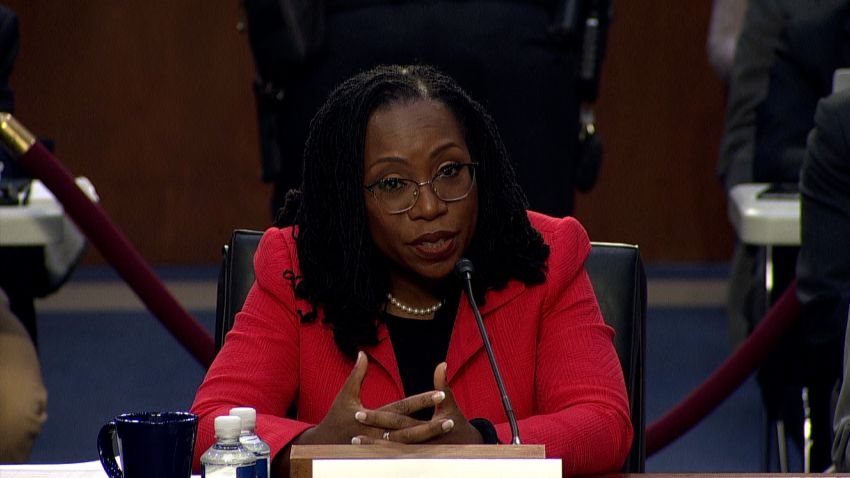Editor’s Note: Elie Honig is a CNN senior legal analyst and former federal and state prosecutor, and author of “Hatchet Man: How Bill Barr Broke the Prosecutor’s Code and Corrupted the Justice Department.” The views expressed here are his own. View more opinion on CNN. Watch Honig answer readers’ questions on “CNN Newsroom With Jim Acosta” on weekends.
After day one of the Senate confirmation hearings of Judge (likely soon-to-be Justice) Ketanji Brown Jackson, this much is clear: Jackson is eminently qualified, she’s unflappable and she’s virtually certain to be confirmed. Republican senators would be wise to choose their battles. They ought to consider defying recent political convention and throwing their support behind Jackson’s nomination.

First thing first. Jackson is amply qualified: two degrees from Harvard, a mega-prestigious clerkship on the US Supreme Court with Justice Stephen Breyer (whom she is about to succeed), hands-on work as a public defender and on the US Sentencing Commission, plus nine years as a federal judge, both at the trial and appellate levels.
As CNN Supreme Court analyst Steve Vladeck notes, Jackson has more judicial experience than 43 of the last 58 justices to take the bench, and more than current Chief Justice John Roberts and Justices Clarence Thomas, Elena Kagan and Amy Coney Barrett had, combined, when they were confirmed.
Not only is Jackson a supremely qualified nominee, but she’s poised to become an important first: the first Black woman to be confirmed to the US Supreme Court. It’s well past time.
Even beyond the judge’s sterling resume, she makes for a difficult target politically. In her introductory speech, she stressed her own family and religious background, including relatives who worked in law enforcement. She has gained endorsements not only from Democrats and liberal groups (as expected) but also from prominent conservative judges and lawyers and from the nation’s largest police union.
The Senate has confirmed her three times – to the US Sentencing Commission, the district court and the appellate court – most recently just last year when three Republican senators voted for her confirmation to the US Court of Appeals for the District of Columbia Circuit. Other than reflexive partisanship, there’s no reason why more shouldn’t join this time around.
While it’s still not entirely clear how opponents might meaningfully attack Jackson, two general lines of argument emerged during the first day of confirmation hearings. One argument boils down to, essentially, We don’t like some of the people who support her. Senate Minority Leader Mitch McConnell declared last month that Jackson is the “favored choice of far-left dark-money groups.”
That’s an attenuated hook, a bank shot, insufficient to overcome the powerful case for confirmation. The argument itself reeks of desperation. Opponents don’t see a strong argument against Jackson herself, so instead they go after others who support her (or, at least, some of them; no mention from McConnell about the aforementioned conservative judges and police unions who endorse Jackson).
The second primary thread of opposition to Jackson is that, primarily because of her experience as a public defender, she will be somehow soft on crime – or, as McConnell put it, she might have “special empathy for criminal defendants.” As a longtime former prosecutor, I have no hesitation saying: What’s wrong with that? Typically, we want our judges to have empathy for the parties appearing before them; it’s a core judicial virtue, along with temperance, impartiality and wisdom.
Republican Sen. Charles Grassley, the ranking member of the Senate Judiciary Committee, noted correctly that prior conservative nominees, including Roberts and Barrett, had represented criminal defendants during their careers. But Grassley then offered up a bogus distinction between what he termed “Bill of Rights attorneys” (the good kind of defense lawyers apparently) and “‘criminal defense lawyers’ who disagree with our criminal laws” (the bad kind, in Grassley’s view).
Of course, that’s a false, overly simplistic reduction; defense lawyers represent their clients zealously, put the government to its burden of proof and ensure constitutional rights and due process for all accused persons.
The Republican National Committee has voiced a related line of attack aimed at Jackson’s prior representation of terrorism suspects detained at Guantanamo Bay. The RNC has complained that her “advocacy for these terrorists was ‘zealous,’ going beyond just giving them a competent defense.”
The complaint here seems to be that she did an important job and did it well. Again, this argumentative tack not only falls flat but backfires. It’s the duty of any lawyer to represent her clients not just competently but zealously – including those who are unpopular, even those who stand accused of horrible acts.
It’s unfair to attack Jackson, or any person, for previous criminal defense work. Defense lawyers didn’t commit the crimes at issue, nor do they personally vouch for the acts of their clients. Rather, they serve a vital and necessary role in our constitutional democracy by ensuring due process and protecting the rights of the accused. The fact that Jackson did that job well, and with empathy, should, if anything, work in her favor.
Get our free weekly newsletter
In her opening statement Monday to the Senate Judiciary Committee, Jackson stressed the bedrock fundamentals of the job: political independence, respect for legal precedent, judicial impartiality and transparency. Jackson expressed her deep respect for country and Constitution.
We’ll see, when the hearings resume Tuesday, how Jackson responds directly to potentially hostile questioning. I don’t expect her to take on much damage; if anything, be prepared for the case for confirmation to be even stronger after she has a chance to address her detractors directly. They ultimately might be wise to throw their support behind her.

























